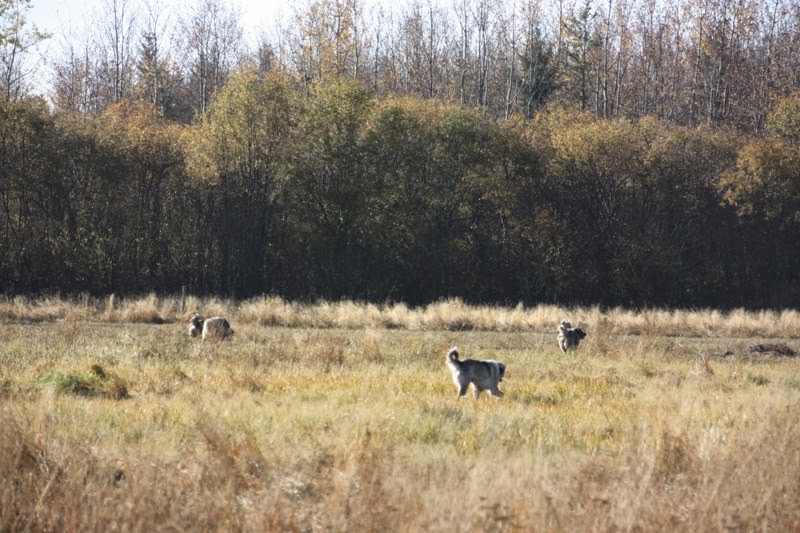Sometimes, people will phone us to ask us if they can come and see the dogs working.
"Sure"...
Most are somewhat disappointed as,
what they usually see are the Sarplaninac's
what they usually see are the Sarplaninac's
laying at a feeder,
or, strolling around the pasture,
or sleeping under a tree,
if we are lucky they may even come and greet us
.
What most people want to see however is "action",
preferably one that involves the dogs "engaging" with a predator.
Some people even question if the dogs are really working,
since what they mostly see is a big dog sleeping under a tree.
.
What most people want to see however is "action",
preferably one that involves the dogs "engaging" with a predator.
Some people even question if the dogs are really working,
since what they mostly see is a big dog sleeping under a tree.
However, most of the work that livestock guardians do is "underground"
they have more of a subtle and persuasive approach
to warn predators off.
to warn predators off.
I think that 80% of the work they do is non confrontational
(depending of course on region and predator load)
(depending of course on region and predator load)
They lay down scent trails,
they patrol,
they bark,
they stake claim to their territory,
they are a pack,
a pack that includes livestock!
All of the above actions are a big part of their job,
and that is the power of what LGD do,
as they can do this 24/7/365.
The dog's presence, is already somewhat of deterrence to predators.
I see this daily, when the ewes and dogs enter the grazing area,
I see a coyote slip off a hay bale and move out of this area.
Sheep and dogs move in, and the predator moves out.
Sheep and dogs move in, and the predator moves out.
That is what keeps predators alive and respectful,
and the sheep safe.
So, watching the dog's work is not something action packed,
as the encounters are often not seen.
It is a process,
it is a sum of many actions combined together,
it is a sum of many actions combined together,
the pack mentality,
the peeing,
the peeing,
the barking,
the proximity to the stock,
the willingness to confront,
the hazing,
the patrols
and, of course their dedication to their job.
This is why LGD are so successful in what they do.
They are a 24/7/365 security system.
Predators habituate to sounds and lights,
shepherds need to sleep and have days off,
This is why LGD are so successful in what they do.
They are a 24/7/365 security system.
Predators habituate to sounds and lights,
shepherds need to sleep and have days off,
and fences are not infallible.
The dogs,
The dogs,
are always on duty, even when they sleep.
They work for food, a kind word and a pat on their head.
They work for food, a kind word and a pat on their head.
Here are some photo's of the dogs working.
Do you see the dog patrolling?
Here it is again:
I zoomed in so that she is better visible.
Off to investigate new smells.
Heading out to check coyote trails
exploring, scent marking on the way









No comments:
Post a Comment